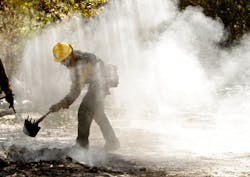Federal Officials Share Outlook for 2012 Fire Season
Following a fire season last year that ravaged parts of Texas and the Midwest, among other parts of the U.S., federal officials say they expect more of the same.
"We anticipate that we're going to have a similar amount of activity as we did last year," U.S. Forest Service Chief Tom Tidwell said during a conference call Thursday.
There will be more than 15,000 federal firefighters available and Tidwell said that manpower combined with strategically positioned aircraft and ground equipment help increase initial attack capabilities.
Of the 20,000 wildland fires that occur each year, only a small percentage aren't put out during the initial attack.
"The reason we're so successful is the level of cooperation we have (on the federal and local levels)," Tidwell said. "It's by working together that we've created this system that has such a high response rate."
With the help of state and local departments to get the word out to residents of the importance of fire prevention, many of the fires can be avoided, he said.
"The vast majority of wildfires are human-caused. If we can reduce just a few of them, our firefighters can focus on the ones that are lightning-caused."
Many of those fires are linked to improperly discarded cigarettes and unattended camp fires.
"Anything we can do to reduce those types of fires will make the work easier for firefighters," he said.
Ed Delgado with the National Interagency Fire Center said that while there is a lot of uncertainty, there are some main factors that they are trying to key in on.
There is a current drought affecting much of the Southwest from western Texas to California and into the Great Basin that is expected to increase the fire risk for those areas.
Other areas of concern are the western slopes of the Rockies in Colorado, parts of the Southeast to include southern Georgia and northern Florida, northern Wisconsin and Minnesota and parts of Hawaii.
Agriculture Secretary Tom Vilsack said that while predicting the fire season is a difficult task, everything is being done to make sure that firefighting crews are prepared.
"Anything can happen during the fire season," he said. "Last year was very difficult in certain parts of the country and in others it wasn't as difficult."
Vilsack praised the efforts of the firefighters that will respond to the numerous wildfires expected to occur this year.
"I can't say enough about the folks that fight these fires. They put their lives on the line every single day," he said. "The fact that they are willing to do it day after day every year . . . hats off to them and their families."
